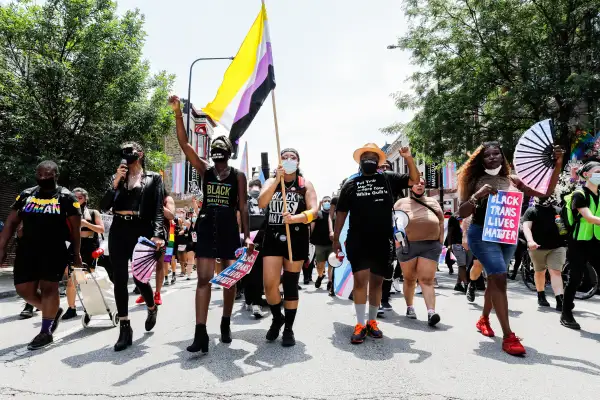What Is Blackout Day 2020? Everything to Know About the July 7 Boycott Urging People to Not Spend Money

Anti-racist protests in the wake of recent high-profile police killings of Black people will take on another form on Tuesday, July 7: economic protest.
Black people spend $1.2 trillion annually in the U.S., according to a 2018 report by Nielsen. But for one day called Blackout Day 2020, organizers of an economic boycott are asking the Black community to spend no money at all, or to spend only at Black-owned businesses.
Boycotts were a key tool in creating change during the Civil Rights Era. For example, after Rosa Parks refused to give her seat on a bus in Montgomery, Alabama, to a white passenger, a boycott of the city’s public transportation system eventually led to a federal court ruling that laws keeping buses segregated were unconstitutional.
More recently, there have been boycotts against a Whole Foods that sent home employees for wearing a face mask that said “Black Lives Matter.” Last month, #BoycottStarbucks was trending on Twitter after the coffee company told employees not to wear Black Lives Matter attire.
What Is Blackout Day 2020?
Blackout Day 2020, taking place on Tuesday, July 7, is a call to action to unite Black people in economic solidarity. In a video posted May 8, 2020, the event's founder, Texas-based Calvin Martyr, asked for Black people in America for one day to not spend a dollar — “not online, not on Amazon, no fast food places, no restaurants, no stores.”
“The only way as a people that we will get any change is if we unite,” said Martyr, who is the founder of The Blackout Coalition and a musician who has been recording and playing shows since 2008, according to his Facebook page.
On the official website for Blackout Day 2020, organizers have outlined what they want, including to “stop being shot down in the streets” and “equal opportunity to access funding so that we can conduct business and practice group economics amongst ourselves.”
In a video on Instagram summarizing Blackout Day, Martyr asked that if participants must spend money, that they spend it with Black-owned businesses exclusively.
The economic boycott is not to be confused with #BlackoutTuesday, which you probably saw alongside black squares all over your Instagram for one day in June. Blackout Day 2020 is also different from the original Blackout Day. In 2015, three Black people created the first “Blackout Day,” which, according to the movement’s Tumblr page was 24 hours of “exclusively posting and reblogging pics, gifs, videos, selfies, etc. of Black people.”
Blackout Day 2020 — the economic boycott on July 7 — is using the hashtag originally started back in 2015. Mars Sebastian, one of the organizers of the original “Blackout Day,” tweeted that the tag has often been used for different movements since its origination five years ago. (This Buzzfeed News article explains this in more detail and was linked to on the original Blackout Day site Sebastian and her co-creators started.)
Martyr said that although this boycott will only be for the day, he hopes to plan others for longer periods of time in the future.
“If we can do it for a day, we can do it for a week, a month, a quarter, a year … and one day we will look up and it will be a way of life,” the website says.
How to Participate in the Blackout Day Boycott
While organizers said on the website that Blackout Day 2020 is aimed at empowering and uplifting Black people, the movement welcomes allies. "We welcome ALL people of color to stand with us in solidarity," a statement on BlackoutDay.org explains. "While we welcome allies who choose to stand with us, we make absolutely no apology for the fact this movement is FOR US & BY US."
Participants can commit to take action via the Blackout Day 2020 website. If you want to participate, the main guideline is simple: don't spend money on July 7, 2020. And if you must spend money, buy from Black-owned businesses.
Those businesses could use your money as they have been facing the worst of the coronavirus’ economic hit. (More than 40% of Black business owners said they weren’t working in April, while only 17% of white business owners said the same, according to a report from the University of California at Santa Cruz.)
How to Support Black-Owned Businesses
Social media can be a good place to start your search for Black-owned businesses. Hashtags like #SupportBlackBusiness and #BlackOwnedBusiness on Instagram and Twitter will help you find tons of places to purchase things you might be buying everyday, from food to clothes to beauty products.
There are also many websites and apps specifically made to help you find and support Black-owned businesses. For example, The website and mobile app Support Black Owned can help you find businesses in your specific area by searching for your city and the type of purchase you’re looking to make. If you’re into online shopping, We Buy Black is an online marketplace with items from Black-owned businesses. Etsy is also highlighting Black-owned Etsy shops. If you’re looking to grab some grub, you can locate Black-owned restaurants with the app EatOkra. The Blackout Coalition also created a directory to help you find Black-owned businesses near you.
With a little research, there are likely more resources available for your location specifically. Black-Owned Brooklyn, for example, shines a light on Black-owned businesses in Brooklyn, New York.
More from Money:
How to Decide Where to Donate Money and Make an Impact Right Now
Attention, Bosses: Here's How to Design a Diversity Policy That Actually Makes a Difference
PPP, the Coronavirus Relief Program for Small Business Loans, Extended 5 More Weeks
